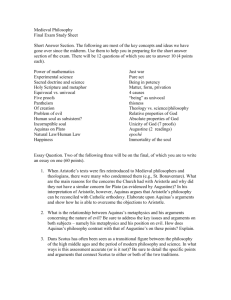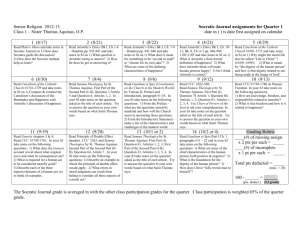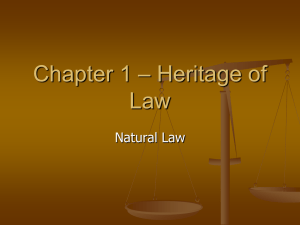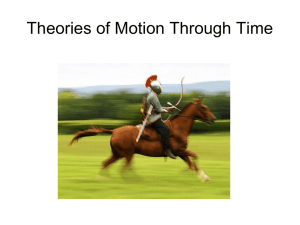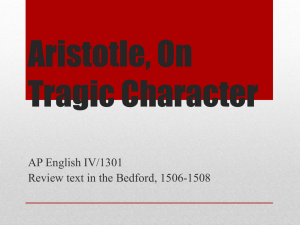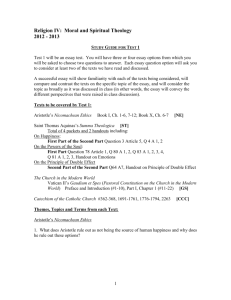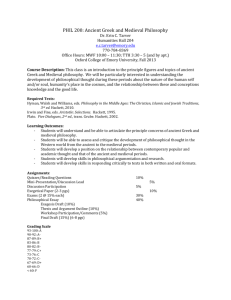Natural Law - St Vincent College
advertisement
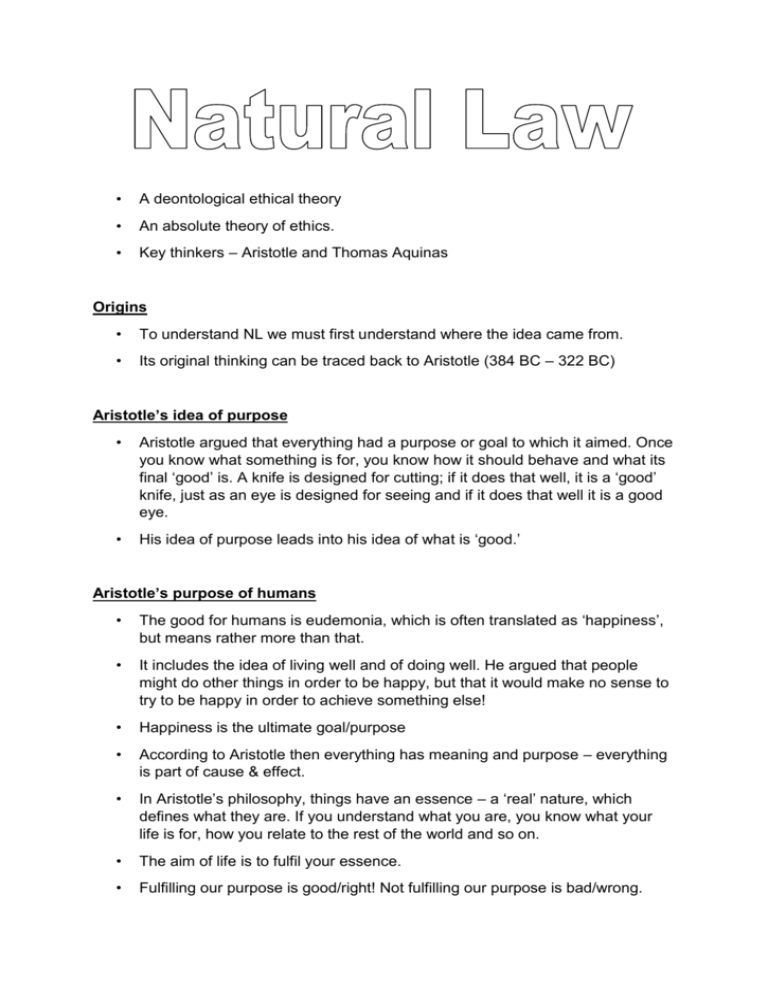
• A deontological ethical theory • An absolute theory of ethics. • Key thinkers – Aristotle and Thomas Aquinas Origins • To understand NL we must first understand where the idea came from. • Its original thinking can be traced back to Aristotle (384 BC – 322 BC) Aristotle’s idea of purpose • Aristotle argued that everything had a purpose or goal to which it aimed. Once you know what something is for, you know how it should behave and what its final ‘good’ is. A knife is designed for cutting; if it does that well, it is a ‘good’ knife, just as an eye is designed for seeing and if it does that well it is a good eye. • His idea of purpose leads into his idea of what is ‘good.’ Aristotle’s purpose of humans • The good for humans is eudemonia, which is often translated as ‘happiness’, but means rather more than that. • It includes the idea of living well and of doing well. He argued that people might do other things in order to be happy, but that it would make no sense to try to be happy in order to achieve something else! • Happiness is the ultimate goal/purpose • According to Aristotle then everything has meaning and purpose – everything is part of cause & effect. • In Aristotle’s philosophy, things have an essence – a ‘real’ nature, which defines what they are. If you understand what you are, you know what your life is for, how you relate to the rest of the world and so on. • The aim of life is to fulfil your essence. • Fulfilling our purpose is good/right! Not fulfilling our purpose is bad/wrong. From Aristotle to Natural Law • Aristotle’s ideas were used by Thomas Aquinas to form his theory of Natural Law - to argue that the world was created by God and everything should therefore have God’s ultimate purpose as its final ‘end’ or ‘good’. What is Natural Law? • Natural Law is unchangeable and universal- the goods govern all human cultures at all times- valid for all nations and all times. • Aquinas considered that natural law was the moral code which human beings are naturally inclined towards. God reveals specific commands but these do not go against Natural Law but rather further develop it. Aquinas said that the moral life is the life which is lived “according to reason” and acting in accordance with reason was the same as acting as a Christian would act. Aquinas view of purpose • Natural Law says that everything has a purpose, and that mankind was made by God with a specific design or objective in mind (although it doesn’t require belief in God). • It says that this purpose can be known through reason. As a result, fulfilling the purpose of our design is the only ‘good’ for humans. • Efficient and final causes: It is Aristotle’s distinction between what gets things done (efficient cause) and the end product (final cause). With humans, it is the accomplishment of the end product that equates to ‘good’. An example is sexuality- an efficient cause of sex is enjoyment: because humans enjoy sex, the species has survived through procreation. However, the final cause of sex (the thing God designed it for) is procreation. Therefore sex is only good if procreation is possible. Reason and purpose • The purpose of humans is: To live To reproduce To learn To have an ordered society To worship God • Reason is used to find out God’s intention and the purpose of human existence and this will enable one to arrive at the principles of Natural Law. Natural Law says that everything has a purpose, and that mankind was made by God with a specific design or objective in mind (although it doesn’t require belief in God). It says that this purpose can be known through reason. As a result, fulfilling the purpose of our design is the only ‘good’ for humans. Aquinas believed that the 5 primary precepts (as above) are the final purpose for all human beings. Primary and Secondary Precepts • Primary precepts are our purpose in life • Secondary precepts are the absolute rules that are formed from the primary precepts – for example the primary precept to reproduce would lead to the absolute law against the use of contraception and abortion. The Law of double effect You may not always know what the results of your actions will be. You are therefore only responsible for the immediate consequences of your action and not for any secondary and unintended effects. This rule is not attempting to undermine Natural Law but offers a solution to the problem of trying to find a single rule to cover a situation that may have complex layers E.G. Abortion is WRONG as it ends life and interferes with reproduction. However if a doctor performs a life-saving operation in order to save the life of a pregnant woman the fact that the operation terminates the foetus is a secondary effect and not the intention of the original diagnosis.
